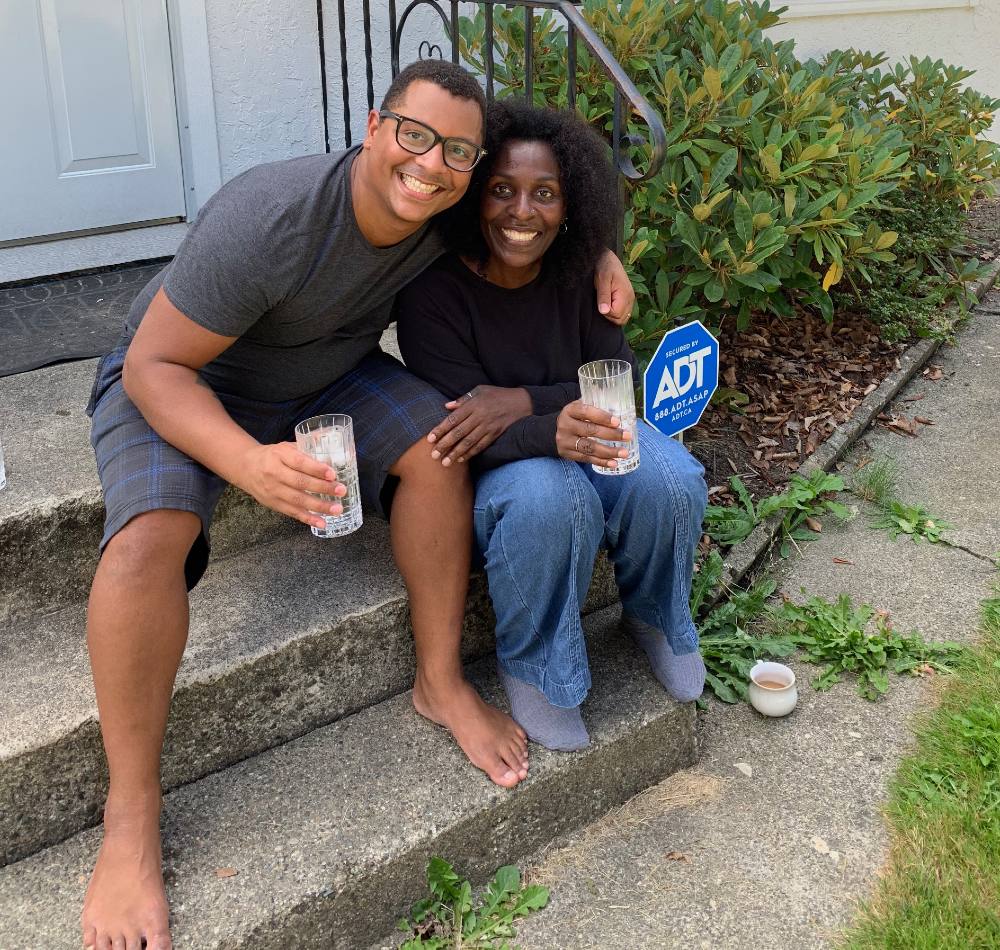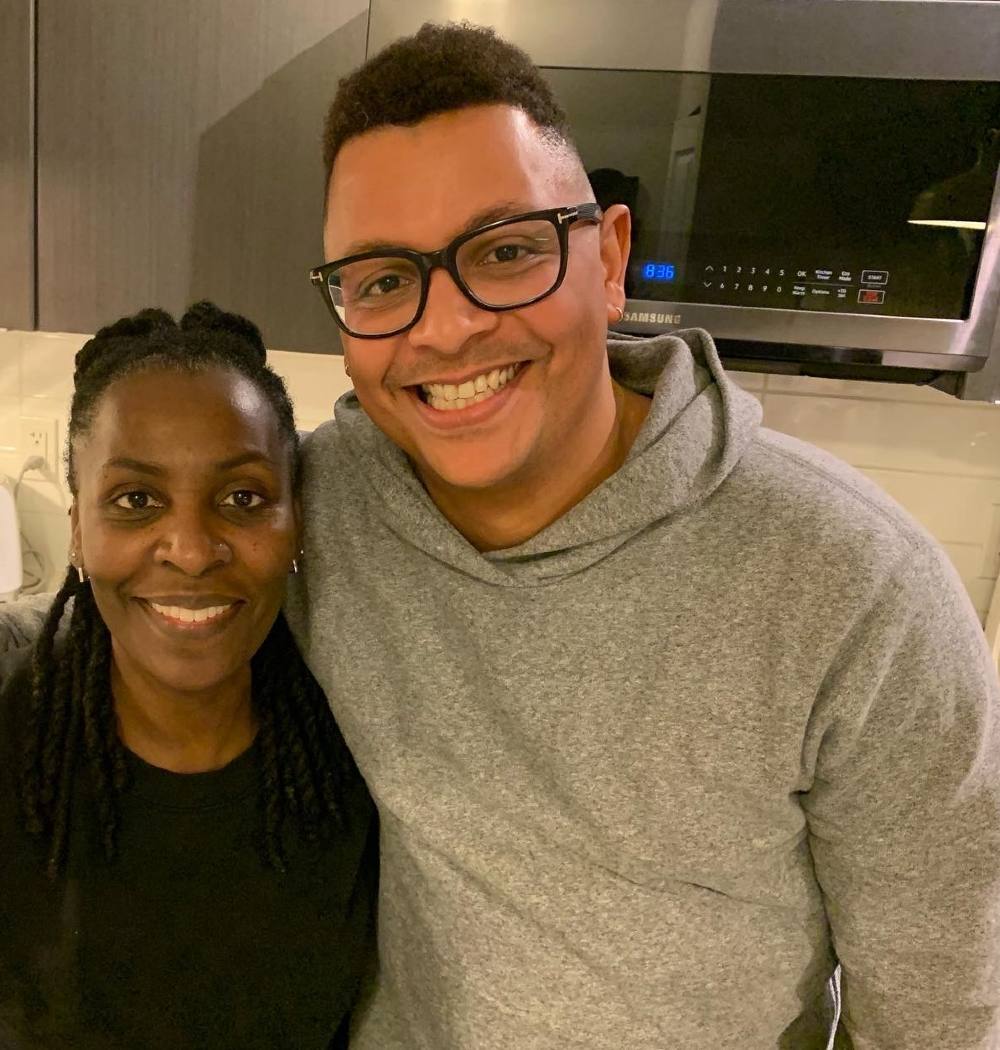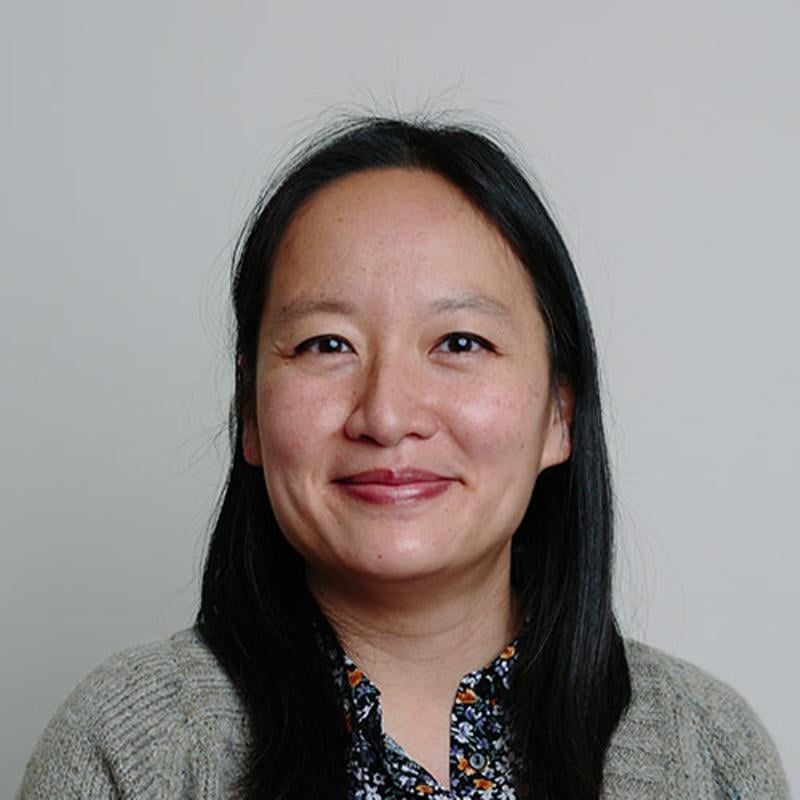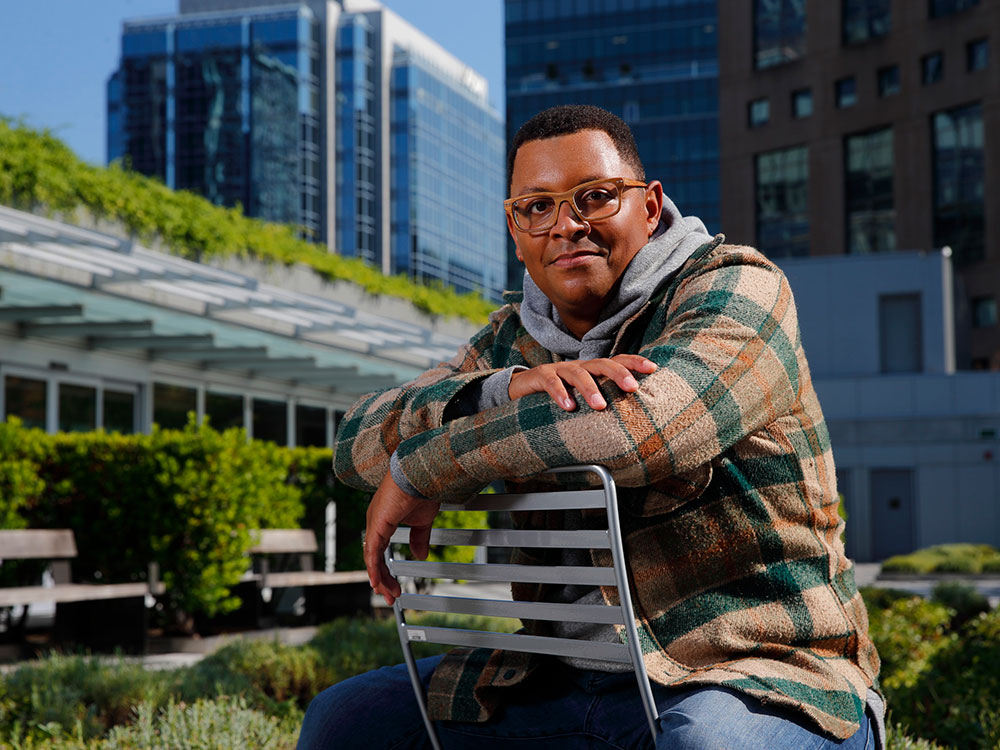- Invisible Boy
- HarperCollins Publishers Ltd. (2022)
I’m sitting in the grass at Dude Chilling Park in Vancouver’s Mount Pleasant neighbourhood on a sunny Friday afternoon. “I’m under a tree with a sign about free yoga,” I type into my phone. As soon as I hit send, Harrison Mooney shouts my name. He pulls up on an electric bicycle, sunglasses on. I stand up and we hug. We haven’t seen each other in years. There’s been a pandemic. There were new babies in both of our lives. And this day feels celebratory because we’re arriving on the cusp of something big: Mooney’s first book, Invisible Boy, launches today through HarperCollins Publishers.
It’s the work of a lifetime and the memoir he had to write. Bringing a journalist’s tenacity to the complexities of his upbringing — including abuse and racism — Mooney sheds light on how white supremacy, colonialism and racism shape our lives. It should be required reading — especially in B.C., where we like to pride ourselves on a shaky promise of diversity that betrays the systematic erasure and degradation of racialized people every day.
Invisible Boy is told with a vibrancy unique to the author. Mooney’s generosity of spirit, his sense of humour and capacity to transcend the self creates a book that is as riveting as it is incendiary.
The book follows Mooney through his early years as the only Black child in a white, devoutly Christian family who adopted him as an infant in 1985.
“Black in a white family, someone might scoff, oh, the horror,” Mooney writes in the book. “Did they tie you to a chair and make you eat unseasoned steak?”
“Actually, yes. I was five years old then, and I wasn’t allowed to self-season. Black people, my mother said, holding the salt, are predisposed to heart disease. You’ve had enough already. Eat your dinner.”
Following a protracted struggle in which Mooney refuses to eat dinner and his parents bind him to the dinner table with a yellow rope, he writes a scene in the book that speaks volumes to what he lived through.
“Upstairs in the bathtub, my mother made a joke at my expense. She washed my hands and said: Uh-oh! I scrubbed too hard and the colour came off!
“I looked at my white palms, confused, and I started to sob.
“Oh Harry, you fall for that every time, she would say." Mooney grew up in Abbotsford, B.C., in profound isolation. His adoptive parents kept him at home for most of his childhood and teenage years. They mocked his body, subjecting him to daily abuse and overt racism. He took homeschool classes by correspondence through a Christian education agency based in Florida.
And then Mooney met his birth mother, Trinika, in his early 20s, a relationship that changed his life.
“She sat down, jittery, and I saw my exact face, and both of us just burst into laughter at the utterly, uncanny doppelgängers sitting before us, staring from across the tiny table, with a fondness we could never quite find in the mirror,” he writes of their first meeting in his book.
“I wanted to look at Trinika forever. You can tell when the eyes that regard you are in love with you. I knew it the moment she walked in the door."

Trinika, sent from her home in Ghana to see her father in Canada when she was five, was a high school student living in foster care in Richmond, B.C., when she got pregnant with Mooney. She wanted to keep him but was pressured into giving him up for adoption. The book explores the systemic forces that shaped their separation from each other and their lives afterward. Mooney describes in detail the myriad ways that he was gaslit as a child and teenager whenever he tried to talk about the racism he was experiencing.
“There’s a pernicious form of gaslighting that racialized British Columbians know all too well, where we are rarely seen, except as tokens, and even more rarely believed when we tell the truth about our lived experience,” Mooney tells me.
“It’s a symptom of the ahistoricity of the region, as we continue to deny what’s happened here and the racial violence that has shaped this corner of the world, from residential schools to the Komagata Maru to the destruction of Japantown, Chinatown and Hogan’s Alley… wilful ignorance gives way to regular ignorance. I’m always struck by how elementary conversations around race tend to be in B.C.”
“These are huge issues that will only be solved if we commit to solving them collectively. People out here love to disavow racism, but that’s like disavowing the stuck barge in English Bay. We actually have to dismantle the structure.”
Mooney was recently named the Vancouver Public Library’s 18th writer in residence. He is holding a book launch at the library this Thursday, Sept. 22 at 7 p.m., hosted by Melanie Green of the newly launched Ouano Foundation.
Expect to hear more from Mooney as you move through your days. His book is moving mountains. For now, a chat with The Tyee. This interview has been lightly edited for brevity and clarity.
The Tyee: What I admire about your writing is what may also be challenging for you as a writer — you're documenting living history while holding the complexity of the relationships depicted. Can you tell me about the process of interviewing family members, childhood friends and particularly your brother Ben and first girlfriend Ashley as you wrote this book?
Harrison Mooney: This book required some very stressful conversations. Like many adoptees, I’m fearful of conflict, which leads to rejection. Better to reject oneself in private, I have found. I’m a people-pleaser! But my story — and that’s what it is, not my side of the story, but my story, and thereby mine to tell — is really incendiary, which is why I’ve been so terrified to tell it all this time, not to mention deeply reluctant to discuss it with the central players. In the end, though, the choice was clear: be brave or be silent. And fuck that. So really, there was no choice but to make some uncomfortable phone calls.
I tried to be as open and honest with everyone about what I was writing and why. Some people were not pleased, or else they didn’t understand. Some people made the road to publication very difficult. I imagine that I haven’t heard the last of “some people.”
My chats with Ben and Ashley, on the other hand, were wonderful. More than that, they were healing. My childhood was lonely, in large part, because it seemed like no one in my life shared or even witnessed my experience. But my brother did, my first girlfriend did, and they said so, even when corroboration made us all uncomfortable, affirming my reality in a way that was so necessary, and so restorative. I think sometimes about bell hooks’ definition of love: “The will to extend one's self for the purpose of nurturing one's own or another's spiritual growth.” Ben and Ashley received me with that kind of love. I’m grateful.
Your author's note that prefaces the book closes with this line: “Mine is a story of impact; I write for the millions impacted in similar ways.” Can you describe who these millions are?
I’m writing, first and foremost, for my fellow adoptees, to affirm their complex and confusing experiences, in much the way that Ben and Ashley did for me. Books like mine are rare; stories like mine are not. They’re just so hard to tell.
We are conditioned to reject our history, to never look back, to demonstrate gratitude, always. And if you can manage to cut through the noise, the self-serving narratives others impose, the social and familial pressure, and the fear of abandonment after you point out that stealing a baby is wrong, even if God said you could, you still have to find the words. My hope is that the words are in my book, and that adoptees find a language and a framework for their stories through my own.
Beyond that, however, I write for anyone who lost a family, home or history to white supremacy; anyone displaced or made a stranger by invaders, or invading ideologies; anyone who knows the pain of otherness — the racialized, the marginalized — especially in mostly white communities; anyone who grew up feeling owned instead of loved; anyone afraid to face the truth about their world, about their family, and themselves.
You offer many resonant reflections throughout the book about how parents shape their children’s sense of self. You met your birth mother, Trinika, when you were in your early 20s. You had some very special years together before she died this spring. I am so sorry she's gone. You've credited Trinika for this book and for the life you are living now. Can you tell me more about that?
Meeting my mom changed my life. She had so much love for me. It was undeniable. It didn’t feel like something I had to earn, or something I could lose, and I saw at once the way I’d been held hostage by my adoptive family. I was so used to jumping through hoops for acceptance that I was bowled over by the freedom that came from knowing for a fact that I was loved.
I didn’t know how to handle it. I hid from her for years. The next time we spoke, half a decade later, our lives were totally different. Both of us returned home and packed our bags. We got divorces. We moved. We had settled for incomplete lives, and the moment we saw one another, we saw a way back to some semblance of wholeness, and started again as new people.
I’m heartbroken to have lost my mom, but I’m grateful that she got the chance to break my heart at all. I fought like hell to break out of my cage, confront my deepest trauma and recover our relationship. It was worth it. The grief is overwhelming, but knowing her made me feel born again. Missing her means that she made her way into my heart, against all odds. It’s strange, but I’m proud of my sorrow.

You're now a parent to two young kids. What is it like to be moving through this deep territory of your life and soul through the book — now that it’s out in the world, and people like me are asking you big questions about it — while tending to the daily realities of your children?
I want to say my kids made writing this book almost impossible. My son was born a week before I finished the book proposal. His first birthday came a week after I finished the first draft. For a while there, it was utter chaos. I needed space and quiet to think and to process some pretty messed up memories, but this was during COVID-19, so there was nowhere to go, and we had two kids in diapers who wouldn’t sleep and never stopped screaming. It was discombobulating, to say the least.
Truth is, though, my kids made this book what it is. Holding them both in my arms, I was struck by how miraculous it feels to see yourself reflected in your children. It was the same sensation of genetic mirroring I experienced when I first met Trinika, but this was deeper. These were my kids. It gave me new insight into what my mother went through to bring me into the world, and what she lost when she was coerced into giving me up for adoption.
I thought about giving my kids to the meanest white lady I know. They didn’t deserve that. And beyond that, it gave me a better insight into my own upbringing. I thought about tying my kids to a chair because they wouldn’t eat dinner, or mocking their bodies, or spanking them 17 times in a row, and I realized I’d been abused. It was scary to admit, but my kids made me want to be strong and courageous.
Parenthood and memoir share a common ground in that they force you to confront your inner child. My main complaint with parenthood is that your inner child is out, and he’s awake again, and he’s not happy. You can’t ignore him. You have to respond to his call. It was a good lesson. All through the writing process, my kids demanded a level of engagement that I never knew I had, and they left me too sleep-deprived to pull a single punch. Big ups to them.
Do you think there is a connection between what you've drawn from your upbringing (particularly what healing may exist and may be ongoing) and how you parent your kids?
One of the most important things to me has been ensuring that my kids don’t grow up in an all-white bubble, like I did. I was delighted that they got the chance to meet my mom and form a relationship with her, and now that she’s gone, I’m making a concerted effort to plug into our broader Ghanaian family, and to raise them in community with other Black families and children. I don’t want them to lose that connection. In this house, we love Black people, dammit.
Moreover, in this house, we love one another. My adoptive family gave me all kinds of stuff. They bought me expensive gifts and paid for things, and that’s all well and good. But I never felt loved, and my most reactive trait as a parent is my obsession with telling my kids that I love them, and practising love as I now understand it, embracing their humanity completely, for always, and offering them a safe space to be someone new, every day, without any fear over whether their father loves who they are this time. I do, I do, I do.
Is there anything else you'd like to add?
If you have the money to adopt a child, you have the money to support their mother. Adopt families, not children.
Come back tomorrow to read an excerpt from 'Invisible Boy' in The Tyee. ![]()
Read more: Books, Rights + Justice, Media
















Tyee Commenting Guidelines
Comments that violate guidelines risk being deleted, and violations may result in a temporary or permanent user ban. Maintain the spirit of good conversation to stay in the discussion.
*Please note The Tyee is not a forum for spreading misinformation about COVID-19, denying its existence or minimizing its risk to public health.
Do:
Do not: